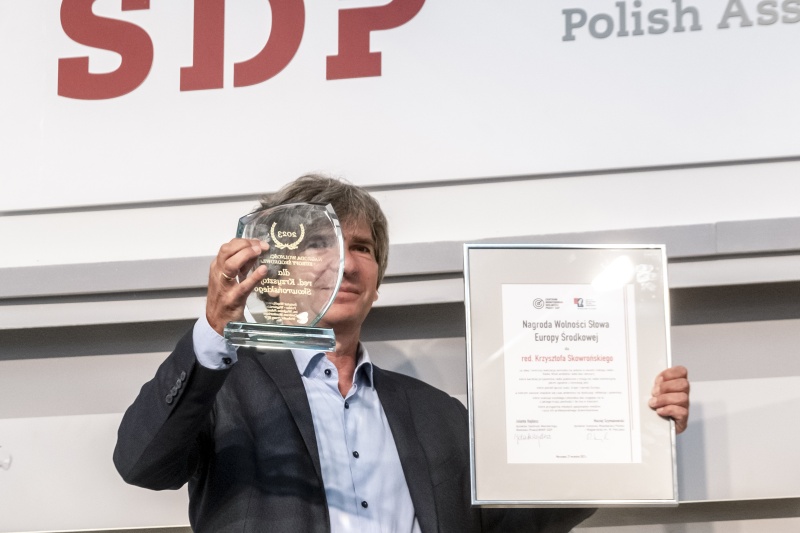One of the advantages of Poland is freedom of discussion and freedom of speech," said Maciej Szymanowski, director of the Felczak Institute, opening a conference on the image of Central European countries in Western European media. The President of the Polish Press Agency agreed with this opinion. "After the Second World War, we did nothing else in Poland but fought for freedom of speech. And it is sacred to us," announced Wojciech Surmacz, arguing that in his opinion, freedom of speech in Poland is currently at one of the highest levels in Europe. In the opinion of Béla Bauer from the Hungarian Századvég Institute, the Western press assesses everything based on its own cultural references. Renowned commentator from Echo24.cz, Ondřej Šmigol, on the other hand, noted that there is little coverage of Czechs in Western media, which, in his opinion, may be due to the fact that his country has not had a truly conservative government for a long time. 'When we behave, no one is interested in us. Maybe we should speak up more?' he rhetorically asked.
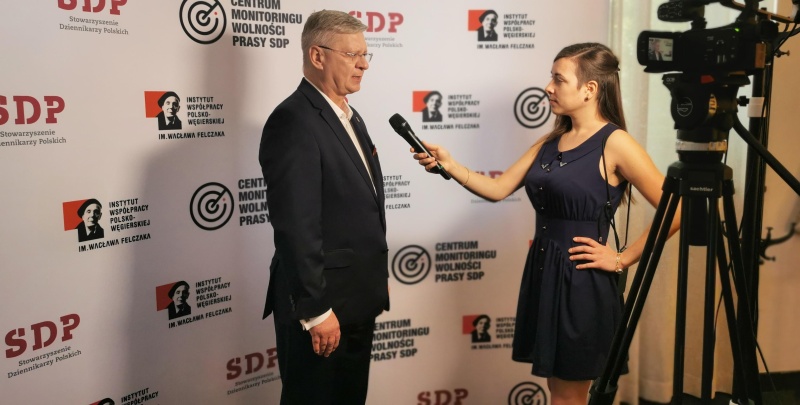
Maciej Szymanowski, the director of the Felczak Institute. Photo by JAP
On Wednesday in Warsaw, a conference titled 'Media about us, we in the media: Image versus Reality of Central European Countries and Societies in Western European Media' took place. Representatives from not only Polish media but also editors, journalists, and correspondents from Belgium, Czech Republic, Croatia, France, and Hungary participated in the event.
Professor Maciej Szymanowski, the head of the Wacław Felczak Polish-Hungarian Cooperation Institute, pointed out the research conducted by the Századvég Institute, which examined the image of Central European countries in Western media and social media. 'As a historian, I can say that what land was in the Middle Ages, what capital was in the 19th century, information is in the 21st century. It is information that currently determines the success or failure of states, their strength, or their weakness,' emphasized Prof. Szymanowski.
A similar opinion was expressed by Jolanta Hajdasz, the director of the Freedom of the Press Monitoring Center at the SDP, noting that the media have already entered every sphere of public life and shape the image of countries and nations. 'Amidst the sea of media messages, what is the truth and what is not, what corresponds to reality, and what is only a media creation about a given country or nation? These are the questions that everyone asks themselves,' announced director Jolanta Hajdasz at the beginning of the conference.
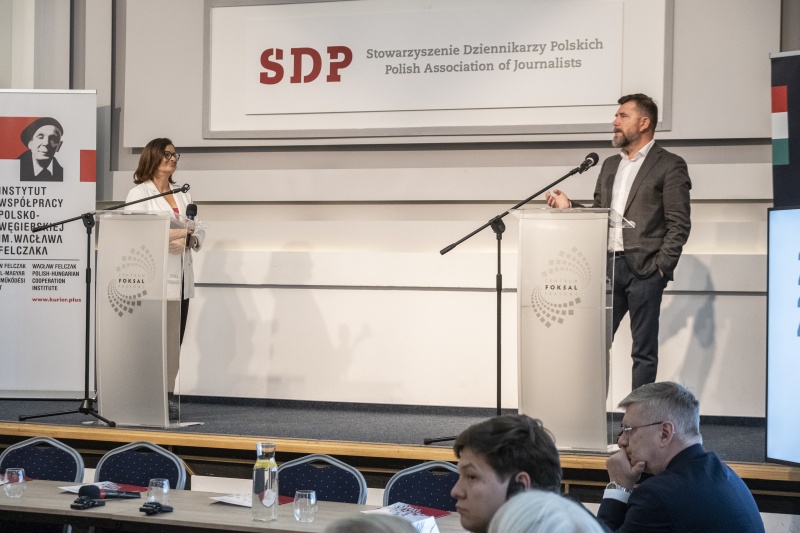
The President of the Polish Press Agency, Wojciech Surmacz. Photo by Robert Woźniak
Wojciech Surmacz, the head of the Polish Press Agency – the media patron of the conference – spoke about the fact that in recent years, he had to convince editors of Western news agencies multiple times that contrary to the claims of some Polish left-wing journalists, freedom of speech is not bad in Poland at all. He also expressed regret that Western reporters often form their opinion about freedom of speech in our country based on conversations in liberal media but do not bother to talk to representatives of conservative media.
'It's a paradox that especially Western journalists want to instruct us on freedom of speech, yet they fail to grasp that after the Second World War, our focus in Poland was primarily on fighting for freedom of speech. This freedom of speech holds immense significance for us,' stressed President Surmacz, evaluating that presently, Poland stands as a country where freedom of speech is at one of the highest levels in Europe. 'Our understanding of freedom of speech and censorship goes much deeper than theirs, considering they didn't experience life during the communist era,' Surmacz noted. He added that since 2015, Poland has made substantial strides in communicating with the Western world and has garnered significant respect from its partners. 'Today, Polish President or Prime Minister no longer have to assert themselves to Western media; instead, the media themselves seek their opinions on specific topics. Poland is being perceived differently compared to the period before 2015,' reflected Wojciech Surmacz.
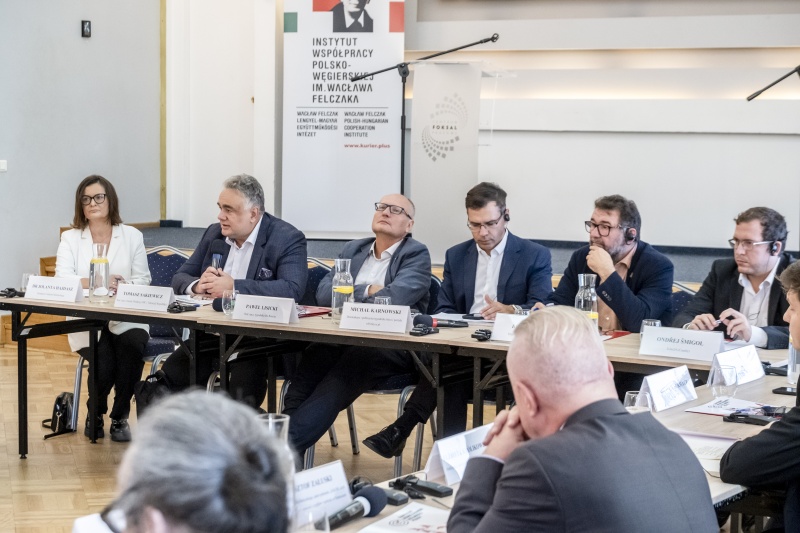
The title of the first panel discussion of the conference was 'About Us Without Us': Truth and Creation Regarding Poland, Czech Republic, Hungary, and Croatia in the Media. Photo by Robert Woźniak
The editor-in-chief of "Gazeta Polska" and Telewizja Republika, Tomasz Sakiewicz, stated that a portion of the European Union is implementing a left-wing revolution project. Tomasz Sakiewicz pointed out that a significant number of stereotypes about Poland have been created in Western media. He noted that many stereotypes about Poles were deliberately created to serve the interests of German or Russian politics. "The true spectrum of the problem lies in the interests of the main managers of the European Union, who, upon admitting new countries to the community, realized that a certain balance of power, which has always been rather fragile, had been disrupted" - Sakiewicz said.
He emphasized that this narrative aims to absolve Berlin or Moscow of responsibility for the Second World War. Sakiewicz observed that the information policy is heavily influenced by the interests of the main administrators of the European Union. He argued that by admitting new EU members, a certain balance of power was disrupted, which had always been quite delicate. He further stated that if Central European countries began to formulate their demands strongly, consciously, and proportionate to their due strength, they could disrupt this balance existing within the European Union and create a new political arrangement. Sakiewicz asserted that Berlin consistently tries to prove that "Central European countries are worse."
The editor-in-chief of the "Do Rzeczy" weekly noticed during the first panel discussion that disinformation regarding Central Europe is not a result of a lack of information about Poland or stereotypes, but mainly a result of a play of interests. "These stereotypes arise from the fact that most Western media adhere to left-liberal values and serve the implementation of the four-element ideology that has largely taken over contemporary West," said Mr. Paweł Lisicki, adding that the misrepresented image of Central European countries created by Western media "does not stem from ignorance or lack of knowledge or a cavalier approach to reality, but is a result of the fact that Western media pursue very specific ideological and political interests." He pointed to immigrationism (the belief that borders of individual countries should be eliminated and as many immigrants as possible, preferably culturally foreign to European values, should be let in), climatism, genderism, and globalization. According to Mr. Lisicki, the negative press about Hungary and Poland is a result of the fact that the governments in Budapest and Warsaw had the courage to oppose this four-element ideology propagated by both the European and American left.
Michał Karnowski, a journalist and commentator for the weekly magazine "Sieci" and the wpolityce.pl portal, highlighted the tight control of the media narrative in countries such as Germany. He emphasized that the political power in Germany has a much greater influence on the media compared to the political power in Poland.
Karnowski noted that there is currently an "attack on the countries in our region, on our communities, in three areas." These areas, as mentioned by him, encompass institutions (states, media, etc.), the economy, and an assault on identity. These tools are used to keep the region under control. "If the issue is named, the attack becomes less effective," he emphasized.
Michał Karnowski pointed out that Berlin and Paris are careful to ensure that nothing emerges that could challenge these interests. He mentioned that the Visegrad Group (V4) has been mocked and the Three Seas Initiative has been torpedoed in this context. Karnowski emphasized that the way to counteract this is through active engagement, and the conference being discussed is an example of such proactive action.
According to Béla Bauer of the Hungarian Századvég Institute, the Western media tends to evaluate everything through the lens of its own cultural background.
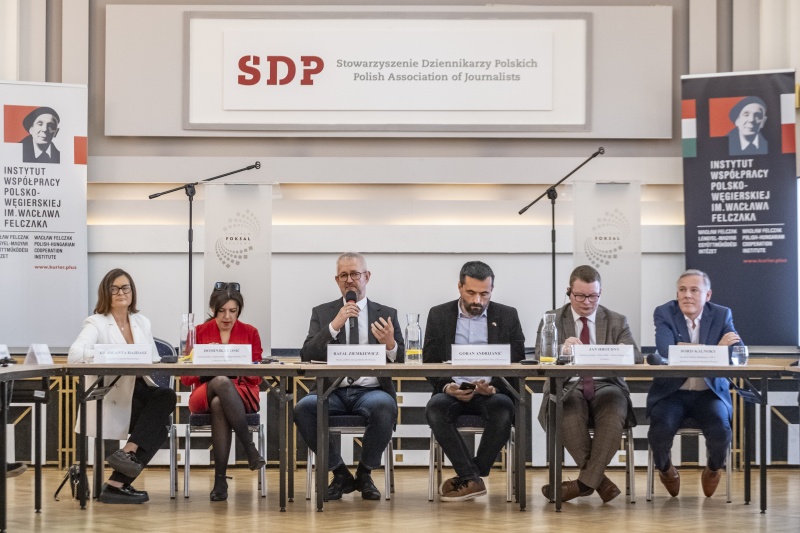
In the second panel, participants included Dominika Cosić, a journalist and columnist, correspondent for TVP in Brussels; Rafał Ziemkiewicz, a writer and columnist for the weekly magazine 'Do Rzeczy'; Jan Bogatko, a correspondent for Polish media from Germany; Goran Andrijanić, a Croatian journalist and columnist for the magazine 'Sieci'; Jan Hroudný, an analyst from the Czech portal Pravý břeh – Prawy Brzeg; and Boris Kálnoky, the director of the Hungarian media school MCC – Mathias Corvinus Collegium. Photo by Robert Woźniak
"Between Lies and Absurdity": The Colonial Mentality of Western Elites Combined with Poles Criticizing Their Own Country
During the second panel on "Between Lies and Absurdity: Fake News about Central Europe," Rafał A. Ziemkiewicz observed that, according to his research, 99 percent, and perhaps even 100 percent, of so-called fake news about Poland was produced within Poland. He emphasized, "These are not inventions of Western journalists or Western media."
"The Polish opposition is an informant opposition, and its main occupation is producing fake news and taking it to the European Parliament, Western newspapers, mobilizing them to support the fight against Polish populism, backwardness, the Polish community, and this nationalist-Catholic government that the Poles choose," he added.
According to Ziemkiewicz, the root of the issue lies in the enduring colonial mindset of Western elites, who view our region as needing to be 'civilized' according to their values. They presume to know the solutions to our problems better than we do, based on their past experiences. 'The problem is that they believe the world is just like them, only parts of the world are backward. The problem is that they fail to see that the countries in our region are different, that we have our own history, that we didn't have colonies, and there was no slavery here', as Ziemkiewicz noted. "For a German, a Frenchman, an Englishman, we are simply like them 50 years ago, who haven't discovered certain things yet and make old mistakes. Therefore, they are convinced that they know the solutions to our problems better than we do because these are their problems from 50, 100 years ago. And they want to solve these problems for us, whether we want it or not, because they know better," pointed out Ziemkiewicz. He highlighted issues such as homosexuality, which was never a real problem in Poland, given the dominance of Catholicism rather than Protestantism. Homosexuality was never a crime in the Polish criminal code, he emphasized. "The West wants to cure us of an illness we never had," he added.
Dominika Cosić, a journalist and commentator, and TVP correspondent in Brussels, agreed with Ziemkiewicz's diagnosis. According to her as well, Dominika Cosić, a journalist and TVP correspondent in Brussels, reiterated that often it's Poles who write false and, at the same time, unfavorable articles about Poland in Western media. She expressed that this is very unfortunate and is not common in Western Europe. British, French, and German citizens may have grievances against their government, but they will try to address them within their country rather than publicize them, she stated.
Goran Andrijanić, a Croatian journalist and commentator for the weekly magazine "Sieci," noted that in the mainstream Croatian media, there is a prevailing left-wing narrative, even when it comes to topics concerning Poland. Andrijanić also emphasized that the Polish media market is the most pluralistic in all of Central Europe.
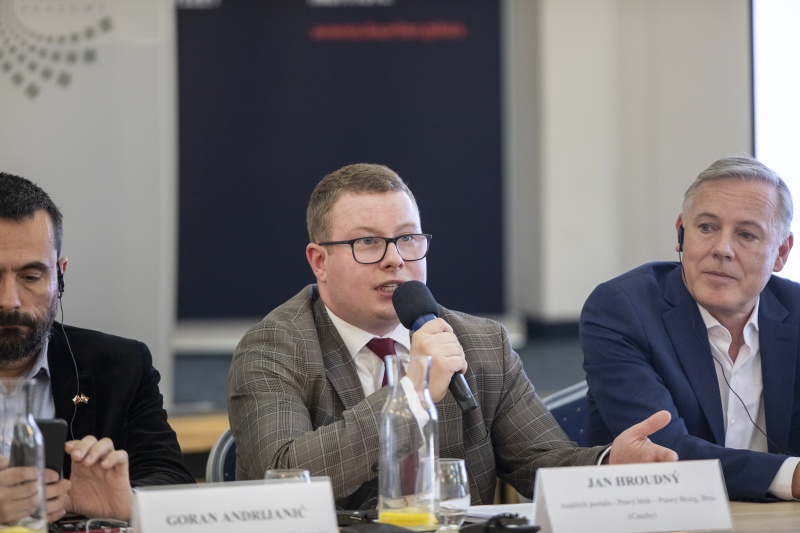
Jan Hroudný. Photo by Robert Woźniak
Jan Hroudný, an analyst from the Czech portal "Pravý břeh" (Right Bank) mentioned that while there are still occasional instances of fake news about Poland in Czech media, there has been a change in perception towards Poland in recent years. He acknowledged the progress in Poland and the substantial assistance provided to Ukraine, emphasizing that isolated cases of fake news do not significantly impact this positive shift in perception.
Boris Kálnoky, the director of the Hungarian media school MCC - Mathias Corvinus Collegium, pointed out that what can be read, especially in the German press about Poland or Hungary, says more about German media than the actual situation along the Vistula or the Danube.
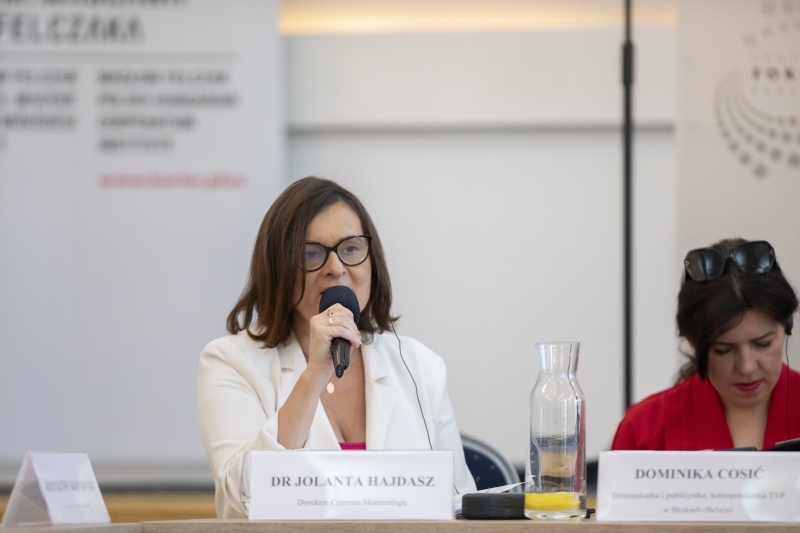
Dr. Jolanta Hajdasz. Photo by Robert Woźniak
Jolanta Hajdasz (Ph.D), the director of the Center for Monitoring Press Freedom at SDP, emphasized that the image of Poland, Hungary, Czech Republic, and Croatia in Western European media is often unjust, unfounded, and even false. She also expressed hope that the Association of Polish Journalists will develop a ranking of media freedom in Europe similar to what Freedom House or Reporters Without Borders do — but done more fairly and objectively," emphasized Jolanta Hajdasz.
Krzysztof Skowroński is a Polish journalist and media expert. He is also the President of the Association of Polish Journalists. Photo by Robert Woźniak
"The Freedom of Speech in Central Europe Award"
During the conference, Krzysztof Skowroński, the President of the Association of Polish Journalists and Radio WNET, received the "Freedom of Speech in Central Europe Award" from the Center for Monitoring Press Freedom of the Association of Polish Journalists and the Polish-Hungarian Cooperation Institute.
"For the idea and creative realization of the unique radio, Radio WNET, an ambitious uncensored radio that resembles more a mission-driven public radio than a commercial one. A radio that can connect people, countries, and nations of Europe, where there is always airtime for discussion, reflection, and debate, and which respects ordinary people regardless of their country of origin and financial standing. As an expression of appreciation for the longstanding work for freedom of speech and credible information," said Maciej Szymanowski, the director of the Felczak Institute, justifying the award to Krzysztof Skowroński.
"Radio WNET is a private radio. It was established in 2009, fourteen years ago, as a form of rebellion against what was happening in Polish media at the time, against the dominance of only one type of narrative about what was happening in Poland and in the world," said the award recipient, noting that over the years, they have managed to create a radio network with studios in many different countries and cities, from Taiwan through Beirut to Paris.

